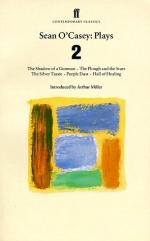|
This section contains 1,623 words (approx. 6 pages at 300 words per page) |

|
Because of his unabashed love of melodramatic devices, and particularly because of his self-taught reflections of the Bible, Shakespeare, and Dion Boucicault, O'Casey has been regarded with some justice as Synge's opposite. An urban primitivist in contrast with the sophisticated, well-read Bohemian, he is deeply committed to the power of impassioned, idiomatic speech to reform society. His seething resentments are spewed upon a puritanical Catholic clergy, the narrow-minded petite bourgeoisie, and [a] government supported by those twin pillars.
However, as O'Casey's rebellious quest for identity (reflected by two name changes) fixed on the craft and vocation of a writer, a double-layered personality came into view. Long before the Abbey produced The Shadow of a Gunman in 1923 when O'Casey was nearly middle-aged, his romanticism reflected a self which was essentially passionate, optimistic, and rebellious…. Perpetually dissatisfied with the shifting, weighty masses of native Irish conflicts, O'Casey successfully unified these...
|
This section contains 1,623 words (approx. 6 pages at 300 words per page) |

|


